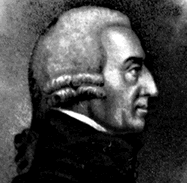smith, Adam

Smith, Adam (1723-1790) Economist and Philosopher: Born in Scotland, he studied at Glasgow and Oxford. In Edinburgh, he joined an intellectual circle which included such men as David Hume. He became a professor of logic, then of moral philosophy at Glasgow, where he wrote Theory of Moral Sentiments based on Hume's teachings. Smith traveled to Paris as the tutor of a duke, then returned to Edinburgh, where he witness the illness and death of his friend Hume. He edited Hume's non-controversial papers and wrote a touching account of his death. In 1776, Hume published a five-chapter volume on the consequences of economic freedom, which was intended to be the first book in a series discussing a complete theory of society. This volume was entitled An Inquiry into the Nature and Causes of the Wealth of Nations, and it became the seminal work in the field later called economics. One of the chapters dealt with colonies, and Smith asserted that mother countries should not regulate or restrict the trade of the colonies, an idea which the American colonists found appealing on grounds of principle. The Inquiry was a work of both political economy and philosophical history, and Smith's description of the progress of societies enabled Americans to re-examine their ideas about progress after they won independence from Britain. Smith also wrote about languages, astronomy, classical physics and logic, and the arts. He was appointed commissioner of customs in Edinburgh in 1778, and named lord rector of Glasgow University in 1787. Three years later, he died.
 >
>